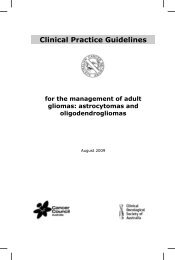Clinical Practice Guidelines for the management of locally advanced ...
Clinical Practice Guidelines for the management of locally advanced ...
Clinical Practice Guidelines for the management of locally advanced ...
You also want an ePaper? Increase the reach of your titles
YUMPU automatically turns print PDFs into web optimized ePapers that Google loves.
7 PALLIATIVE CARE<br />
7.1 What is palliative care?<br />
Palliative care has been defined in a number <strong>of</strong> ways. The World Health Organization (WHO) has<br />
defined palliative care as<br />
…an approach that improves <strong>the</strong> quality <strong>of</strong> life <strong>of</strong> patients and <strong>the</strong>ir families facing<br />
<strong>the</strong> problem associated with life-threatening illness, through <strong>the</strong> prevention and<br />
relief <strong>of</strong> suffering by means <strong>of</strong> early identification and impeccable assessment and<br />
treatment <strong>of</strong> pain and o<strong>the</strong>r problems, physical, psychosocial and spiritual.<br />
Palliative care:<br />
provides relief from pain and o<strong>the</strong>r distressing symptoms;<br />
affirms life and regards dying as a normal process;<br />
intends nei<strong>the</strong>r to hasten nor postpone death;<br />
integrates <strong>the</strong> psychological and spiritual aspects <strong>of</strong> patient care;<br />
<strong>of</strong>fers a support system to help patients live as actively as possible until death;<br />
<strong>of</strong>fers a support system to help <strong>the</strong> family cope during <strong>the</strong> patients illness and<br />
in <strong>the</strong>ir own bereavement;<br />
uses a team approach to address <strong>the</strong> needs <strong>of</strong> patients and <strong>the</strong>ir families,<br />
including bereavement counselling, if indicated;<br />
will enhance quality <strong>of</strong> life, and may also positively influence <strong>the</strong> course <strong>of</strong><br />
illness;<br />
is applicable early in <strong>the</strong> course <strong>of</strong> illness, in conjunction with o<strong>the</strong>r <strong>the</strong>rapies<br />
that are intended to prolong life, such as chemo<strong>the</strong>rapy or radiation <strong>the</strong>rapy,<br />
and includes those investigations needed to better understand and manage<br />
distressing clinical complications. 1<br />
This last point highlights that palliative care should be an active approach to patient <strong>management</strong> and,<br />
when appropriate, integrated into continuing approaches to disease control.<br />
The WHO has also advocated <strong>the</strong> integration <strong>of</strong> comprehensive palliative care and pain <strong>management</strong><br />
into cancer control programs. Palliative care programs are charged with providing pain relief, control<br />
<strong>of</strong> o<strong>the</strong>r symptoms, and psychosocial and spiritual support. 2 This approach has been supported by <strong>the</strong><br />
Australian Government through its National Palliative Care Strategy 3 , and Palliative Care Australia,<br />
<strong>the</strong> national peak body <strong>for</strong> palliative care, which sets a goal that ‘all people who have a life limiting<br />
illness are able to access timely, high quality care appropriate to <strong>the</strong>ir needs’. 4<br />
These plans highlight <strong>the</strong> importance <strong>of</strong> all health pr<strong>of</strong>essionals, from primary care through all<br />
specialties, recognising <strong>the</strong>ir role in <strong>the</strong> provision <strong>of</strong> palliative care, with specialist palliative care<br />
services focussing on those patients with more complex needs. The need <strong>for</strong> access to palliative care<br />
is also recognised in o<strong>the</strong>r prostate cancer guidelines, again emphasising that it should be available<br />
when needed and not limited to <strong>the</strong> end <strong>of</strong> life. 5<br />
Palliative care delivery has been characterised by a team working toge<strong>the</strong>r to provide integrated care<br />
in all domains—physical, emotional, psychological and spiritual. The team can involve a range <strong>of</strong><br />
medical, nursing and allied health personnel, including psychologists, social workers,<br />
<strong>Clinical</strong> practice guidelines <strong>for</strong> <strong>the</strong> <strong>management</strong> <strong>of</strong> <strong>locally</strong> <strong>advanced</strong> and metastatic prostate cancer<br />
96



